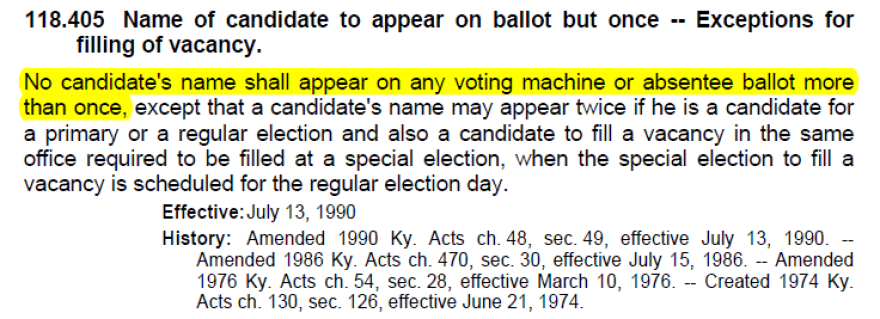Everyone knows Sen. Mitch McConnell had a great election night in Kentucky last week. As for the state's other Republican senator, Rand Paul, that's a different matter.
That's because while McConnell was cruising to a big re-election win on his way to becoming Senate majority leader, things did not go so well for Paul. He was hoping Republicans, who already control the Kentucky Senate, would also take over the state House — a result that would grease the path for a state law allowing him to run for both re-election and the presidency at the same time.
But that failed to happen. And the Democrats who are still in charge of the state House are disinclined to pass a law to help Paul.
Kentucky's Democratic House speaker Greg Stumbo refused to take up the two-ballot-spots-at-once bill earlier this year because it was designed for a single person, in violation of Kentucky's constitution. "There's only one guy who's talking about holding onto his Senate seat and also running for United States president," he told NPR.

With Stumbo still in control, Paul may eventually have to choose between running for the White House and holding onto his Senate seat.
Officially, keeping the Senate seat remains Paul's only goal at this moment. "Sen. Paul is 100 percent focused on his re-election," says spokesman Dan Bayens — even as Paul openly discusses his interest in running for president.
Paul's situation is similar to, but much more difficult than, those facing other Republican senators thought to be considering a 2016 presidential run.
Ohio law, for example, allows Sen. Rob Portman to run for both offices simultaneously. In Florida, the qualifying deadline for U.S. House and Senate seats isn't until May 6, 2016 — meaning Sen. Marco Rubio would almost certainly know whether he was going to be the GOP presidential nominee before he had to file for re-election. Since Texas Sen. Ted Cruz was just elected in 2012, he doesn't have a conflict — he's not up for re-election until 2018.
The deadline for House and Senate candidates in Kentucky is Jan. 26 — six days before the Iowa caucuses, according to the Republican National Committee schedule. Kentucky law states that a candidate cannot appear twice on the same ballot — meaning Paul could either run for Senate or for the presidency but not for both in the Kentucky primary.
Paul and his supporters, though, have already thought of a partial workaround: Change Kentucky's Republican presidential nominating contest from the May 17 primary to a caucus in mid- to late March. That way, Paul could still file for the Kentucky primary ballot in January, appear on (and presumably win) the Senate primary in May — all the while pursuing the presidential nomination.
Paul discussed the possible logistics of a presidential caucus with Kentucky Republican Party chairman Steve Robertson for a half-hour at McConnell's victory party last week, Bayens confirmed.
Switching from the primary to a caucus would not require a change to Kentucky law, but would require ratification by state and local party committees. If the party does want to switch to a caucus, it would likely need to start the process by October 2015.
Of course, should Paul ultimately win the presidential nomination (or accept the vice-presidential nomination), Kentucky law would at that point force him to give up his run for re-election, said Stumbo, with no ability for Kentucky Republicans to replace him on the ballot. "The Democratic candidate would win the seat," he asserted.
The statute in question allows for a candidate's replacement by the party only in the event of death or incapacitation — which, Stumbo said, means physical or mental incapacitation. "Some of us might agree that he's incapable of holding public office, but I'm not sure a court would say that meets the letter of the law," Stumbo said.
Copyright 2021 NPR. To see more, visit https://www.npr.org.






